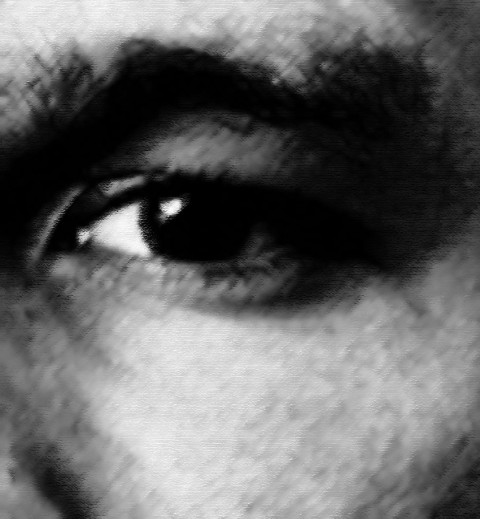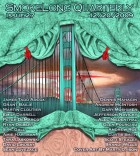Stopping at a roadside market after the hurricane, Miguel put money down on the counter and monkeyed around with his hands to show them he was sick. They gave him three dozen white pills in a ziploc bag. He swallowed two and fell in love with a woman watching him from the corner. Then he continued to the beach.
The damage looked bad, but Miguel’s driver told him that everyone was used to the hurricanes by now; they built things in a way that could be quickly repaired, which is to say, nothing was very solid in the first place. The weary residents seemed to arrange themselves for Miguel in still-life exhibitions as he passed, tableaus that made him wonder whether he was responsible for something more profound than being a white American: a bare-chested man pouring grease into the gutter, teenage girls hugging clothes-filled garbage bags to their midriffs, a child frozen on the cusp of his red riding toy… even the animals seemed to be orienting themselves toward him—the hens pecking through the litter of a smashed barbecue stand paused, their heads cocked, so that the eyes of God (his own eyes, the eyes that taught the universe about itself) could observe the various attributes of their existence.
The driver asked him if he wanted to go to the hospital. Miguel said no, I want a woman. He couldn’t stop thinking about her now, the chica in the roadside market. She was sentada in the corner. He wanted to hablar to her. God, he was totally fucking this language up. But he was an astronomer, not a linguist. He was enfermo. He required native magic to survive; he was dying like a conquistador on an unnamed backwards spit of sand from a disease his countrymen could not identify.
But when Miguel—whose mother called him Michael, of course—returned to the market, the quiet woman in the corner was gone.
“Donde esta la chica?” he said, pointing stupidly at the stool. The women shook their heads and made shooing gestures, their bejeweled knuckles flashing in the razor-sharp light of sunset.
And so not that woman but a different one eventually befell him: she said her name was Carmen but she wanted to be called Carmelita. He had run out of little white pills and he was sick again. He didn’t know Spanish any better than before. Debris from the hurricane still turned up on the beach, the ocean reshuffling whatever could be carried off like a dealer, a card shark playing to the rhythm of the tides.
Carmelita had smiled at him shyly from behind a line of cash registers in Rafael Capo, the town closest to the radio telescope at Arecibo. She had given Miguel more pills. She seemed genuinely concerned about his condition. Though Carmelita was very pretty, she represented everything less than what he had ever hoped for in a woman: short, immature, overmakeuped, material, clingy, enthusiastically agreeable, cigarette smoking… she knew English just as well as Miguel knew Spanish. Carmelita thought Darwin was funny. Origin of the Species—it was written as a practical joke, right? Wait—it is not just a serious idea, but verdad? Their entire relationship was intended to cure him of the illness in a way the pills couldn’t.
One night there was another hurricane turning in the ocean, and she sat next to him on the twin-sized bed of his cottage in the foothills of Esperenza. Without discussion she slid her shirt up over her head, unhooked her bra, and began to take off her blue jeans. Miguel looked at her in astonishment; her breasts offered him massive nipples, landing pads for his tongue.
“Usually—well, my whole life, really—I’ve been an observer,” he confessed. “I’m just—I usually watch—I like it—to watch—do you understand?”
She swept her thick hair to the side. “Porno?” she asked.
He laughed once quickly. “No. Well—sometimes. But that’s not what I mean, so how can I explain?”
He squinted one eye and held up his hands, making a forwards-facing small C with his left and a backwards-facing large C with his right. “Telescope,” he said. His single open eye met hers, which were alcohol-occluded. “Astronomer,” he said. “Observer.”
She leaned forward and brought his right hand near her mouth, trailing her tongue along the axis of his palm. He closed his eyes. He felt her hot breath in his ear and he shivered involuntarily, thinking to himself, this is how the body fights an infection. All language ceased, all knowledge, and the only thing he sensed in that moment was Carmelita’s breath against his ear.
“Muy bueno,” he said.
“Que rico,” she corrected.



 The core workshop of SmokeLong Fitness is all in writing, so you can take part from anywhere at anytime. We are excited about creating a supportive, consistent and structured environment for flash writers to work on their craft in a community. We are thrilled and proud to say that our workshop participants have won, placed, or been listed in every major flash competition. Community works.
The core workshop of SmokeLong Fitness is all in writing, so you can take part from anywhere at anytime. We are excited about creating a supportive, consistent and structured environment for flash writers to work on their craft in a community. We are thrilled and proud to say that our workshop participants have won, placed, or been listed in every major flash competition. Community works.